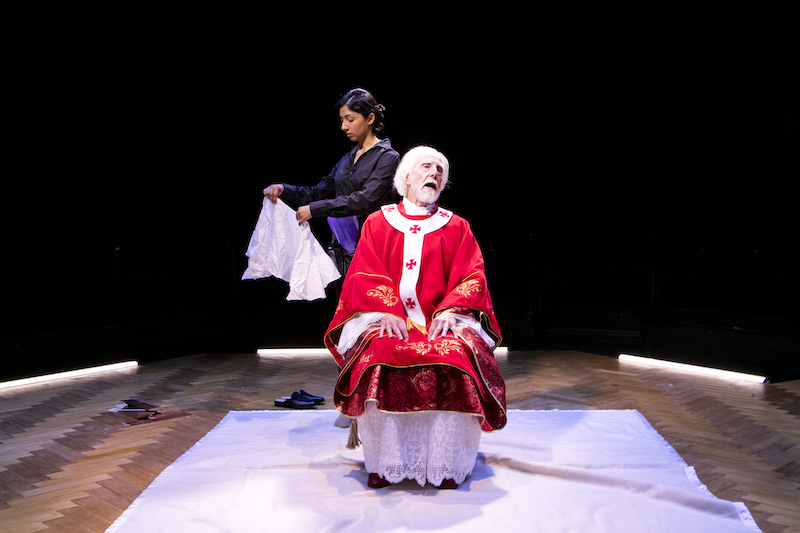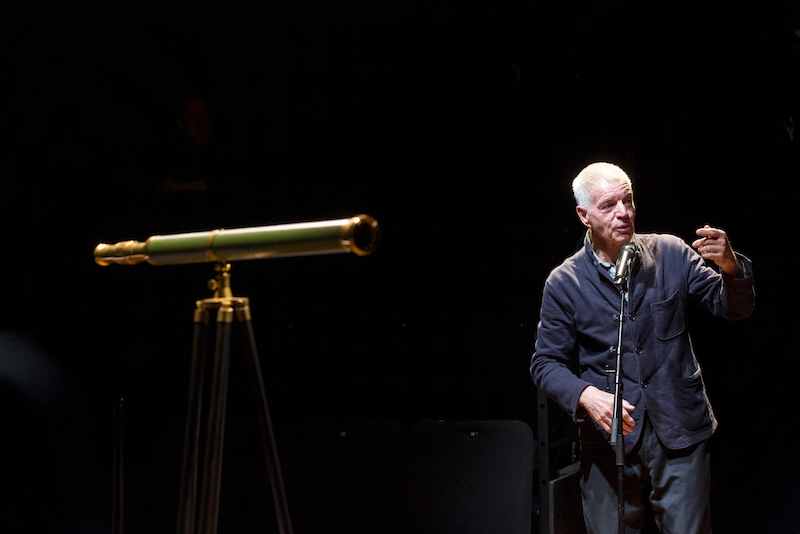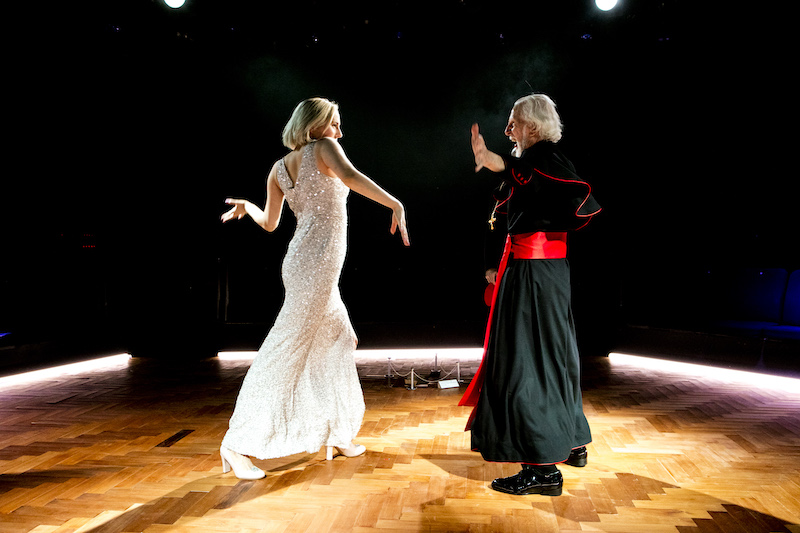There’s a fabulous scene in Eamon Flack’s production of Life of Galileo in which the new Pope Urban VIII (Peter Carroll) is dressed by his staff. Gradually the wizened, elderly man is clothed, layer by layer by layer, in his symbolic, papal regalia until he has been transformed into the supreme head of the Catholic church.
 Peter Carroll and Vaishnavi Suryaprakash. Photograph © Brett Boardman
Peter Carroll and Vaishnavi Suryaprakash. Photograph © Brett Boardman
Meanwhile, the Cardinal Inquisitor (Damien Ryan), gets into his ear about Galileo. The Pope maintains that you can’t use Galileo’s ideas and then condemn him, but to no avail. The Pope may be a former mathematician but he cannot deny the Inquisition, and his fear, frustration, even bewilderment at the situation he finds himself in is abundantly plain in Carroll’s vulnerable expression. It is one of the highlights of the starkly staged production.
Bertolt Brecht’s Life of Galileo follows the story of the great Italian astronomer, mathematician, physicist and engineer Galileo Galilei, moving from Padua in 1609 to Arcetri in Tuscany in 1637 where he died under house arrest, having been found “vehemently suspect of heresy” by the Inquisition. His crime was to champion Copernicus’s new cosmogony of Heliocentrism, which said that the Earth was not the centre of the universe around which the sun and other planets moved, but that it moved around the Sun.
“Where is God in all this?” his detractors wanted to know. The Church saw it as a heretical attack, and a threat to its power. Without faith, how can you continue to suppress the peasants when that is what gives them the strength to endure their tough lives?
 Colin Friels. Photograph © Brett Boardman
Colin Friels. Photograph © Brett Boardman
Brecht wrote the play in 1938 while in exile in Denmark as the Nazis took power. He then rewrote it twice, the last time in 1955 after the horrors of World War II including the dropping of the atomic bomb on Hiroshima.
Watching the play now, it feels incredibly timely as scientists show categorically that the Earth is facing an environmental catastrophe due to climate change but are questioned and ignored by deniers and short-sighted politicians. Galileo had the facts to prove his theory – so do today’s scientists. Themes to do with power, propaganda, dogma, religion and business also feel utterly current.
Tom Wright has written a wonderful adaptation that concentrates the play for a smaller cast, and draws on the contemporary Australian idiom, with references to gap years, a police state, and people being barbecued in the street bringing the script to bristling life.
Flack and his set and costume designer Zoë Atkinson stage the play in the round (creating a similar set-up to the one used for Every Brilliant Thing in March), which works well. The staging is minimal with a parquet floor, a few chairs, balls hanging from the ceiling to represent the planets in Ptolemy’s earth-centred universe, and barriers to cordon off exits for certain scenes. A small screen flashes up the title and location of each scene. Atkinson’s contemporary costuming ranges from suits to a trendy, silver-flecked tracksuit and pink shoes for The Grand Duchess.
The lighting by Paul Jackson and music by Jethro Woodward enhance the tension and mood, with Kate Champion’s choreography including one funny, yet also disquieting, disco scene.
 Miranda Parker and Peter Carroll. Photograph © Brett Boardman
Miranda Parker and Peter Carroll. Photograph © Brett Boardman
As Galileo, Colin Friels gives a passionate portrayal of a complicated, flawed man with an element of the rascal about him; a man who is fascinated with science and the proving of facts, who doesn’t always toe the line and will fudge the truth when necessary to get funding for his research, but who recants his teachings when faced with torture at the hands of the Inquisition. Does he already have plans to write in secret? Or does he simply want to save his life? It’s a compelling, moving performance of an Everyman in one respect, but a driven man with a genius mind.
Friels is surrounded by a strong cast, who play several roles. Vaishnavi Suryaprakash is particularly impressive as Andrea Sarti (here rewritten as a girl), who is taught by Galileo as a child and becomes one of his followers, then later one of his disillusioned critics. Damien Ryan shows his versatility in roles ranging from Galileo’s friend to the Chief Inquisitor. Peter Carroll brings welcome relief in several comic cameos and excels as the Pope, with Damien Strouthos, Rajan Velu, Sonia Todd, Miranda Parker and Laura McDonald all lending sterling support.
There are times when the production struggles to maintain its dramatic tension and the audience’s attention seems to flag. Occasional scenes where a character walks around unnecessarily end up being distracting, but overall the production keeps you fascinated by the discussion of ideas, the issues at stake, and the play’s frightening relevance.
Life of Galileo plays at Belvoir until August 7











Comments
Log in to join the conversation.